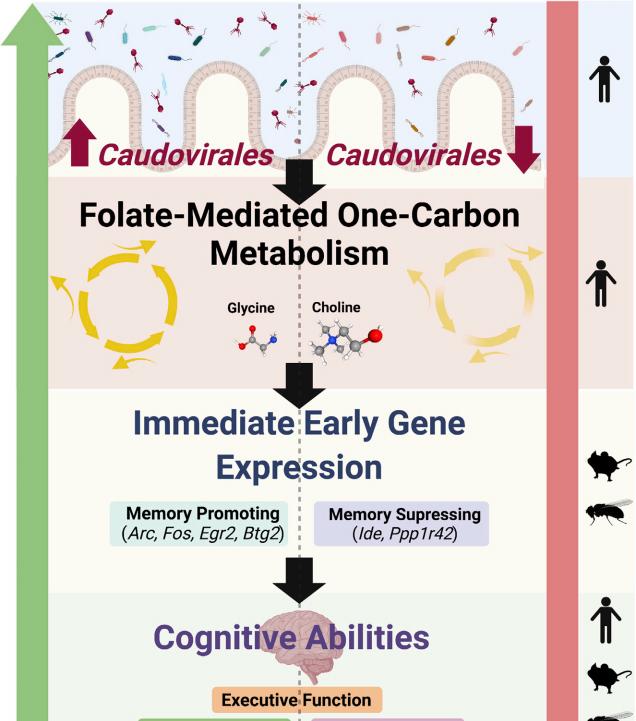No.
01
The important role of viruses in the gut-brain axis
原文:The gut-brain axis goes viral
Cell Host Microbe IF:20.813
Numerous recent studies have shown the importance of the host microbiome for host neural function. The likes of Mayberis-Perxachs and Castells-Nobau have revealed the role of intestinal parasitic bacteriophages in microbial composition and metabolism, and their downstream effects on neurogene expression and cognition.
The microbiome in an organism plays an important role in many aspects of host physiology. Among these microorganisms, the number of viruses is about 10 times the number of bacteria, based on the huge number of viruses and the rich genetic diversity, as well as the interaction between phages and bacterial hosts, bacteriophages become the basis for structure and function in the microbial community, including the symbiotic microbial community in the human body.
Although gut microbiome research has been accumulated for decades, the effects of bacteriophage activity in the gut on host nerve function and physiology have yet to be studied.
The association of the viral group with aging, disease, and/or diet has been reported.
Non-commensal viruses (i.e., human pathogens in the traditional sense) are associated with neurological diseases, such as the association of EBV viruses with multiple sclerosis.
In addition, a recent study analyzed the association between fecal co-habitat phages and a series of cognitive assessments, and found that the level of specific tailed phages was positively correlated with the executive function index, while the increase in the level of microphages in the feces was associated with the decrease in executive function.
Since it is often assumed that phages do not directly affect human physiology, the study of phage groups, bacterial population composition, and metabolites can provide light for answering the question of whether phages affect cognition or whether these associations are merely appearances.
At the same time, the phage group and the host gene expression profile can be analyzed at the same time to find the effect of phage group changes on the host gene expression.
This article provides a fresh perspective on the correlation between enterovirus groups, metabolism, and host cognitive processes.

02
Longitudinal analysis revealed that high incidence of EBV was associated with multiple sclerosis
原文:Longitudinal analysis reveals high prevalence of Epstein-Barr virus associated with multiple sclerosis
ScienceIF:47.7
Multiple sclerosis (MS) is a chronic infectious demyelinating disease of the central nervous system of unknown etiology. The study, which included 10 million U.S. service members who used to validate the hypothesis that EBV infection causes MS, conducted a 20-year follow-up study in which 955 were diagnosed with MS during service. A total of 801 MS patients and 1566 controls had samples at different points in time to detect EBV infection status. The age of most individuals at the time of their first blood collection
The risk of MS increases 32-fold after infection with EBV, but the risk of contracting other viruses, including CMV, is also transmitted.
Serologic levels of the nerve fiber light chain, a marker of neuromyelination, are elevated only after the presence of EBV serologic transformation. These findings cannot be explained by known risk factors for MS, and it is speculated that EBV is the primary causative factor for MS.
This article is reproduced from: Gene Gang